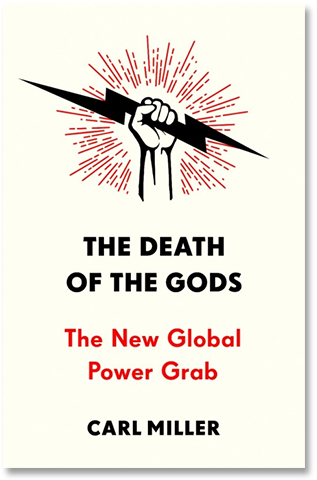The Death of the Gods, book review: Power in the digital age


The Death of the Gods: The New Global Power Grab • By Carl Miller • William Heinemann • 374 pages • ISBN: 978-1-785-15133-0 • £20
In the 25 years since the internet became a thing, how much has the nexus of power really changed? On the one hand, a visitor to the House of Lords will be shown the shields of the ancient families who ruled Britain, only to learn that at least some of their descendants are rulers to this day. On the other hand, none of us are safe from remote technical miscreants with the desire to invade our personal and financial lives. How much has really changed and should we be afraid?
In The Death of the Gods: The New Global Power Grab, Carl Miller, a researcher at the Demos think tank, examines the power shift the internet is bringing across a range of sectors.
In the chapter on people, he looks at the effect hackers can have on individuals. In 'Crime', he looks at the inability of police to cope with attacks that cross national and technical boundaries. In 'Business', he notes the Google-started trend toward granting disproportionate control of shareholder voting rights to rock-star CEOs and the effect on workers of shrinking rights and pay. In 'Media', he finds that a single guy with time on his hands and a YouTube channel can almost single-handedly investigate in-depth remote events in ways the traditional media can no longer afford.
In politics, one individual -- Audrey Tang -- has managed to change how her country makes decisions. In warfare, state actors may cripple a country without ever having to fund a nuclear warhead. And in technology, intended influence can be hidden by clever design so we consume the results without understanding the consequences. Power, Miller concludes, has changed, and we have both greater access to it and are controlled more intimately by it -- and we don't really understand what's happening.
Solid reporting
There's some solid reporting in this book. Miller travels to places like Silicon Valley and Kosovo, and interviews numerous individuals and groups unknown to most of us, including the 77th Brigade of the British Army and the Defence and Security Media Advisory Committee. As a result, he finds some little-known trends -- the beginning of consolidation in the business of producing 'fake news', for example.
SEE: Special report: How to automate the enterprise (free ebook)
At the same time, the book is restrained compared to the talks Miller has given in order to launch it. At the Parliamentary launch in July, for example, he said that the crisis in law enforcement was the biggest in the history of policing and made the deeply alarming suggestion that we might have to get rid of habeas corpus and jury-based due process. The reasoning is hard to understand, since criminals across the globe don't care about British courts. We're the ones who would suffer under such a regime -- which would represent a more frightening power shift than anything documented in this book.
RECENT AND RELATED CONTENT
Facebook can block hate speech, even if it's not illegal, court rules
Although an anti-immigrant comment doesn't break German law, Facebook can still delete it.
What to do with the data? The evolution of data platforms in a post big data world
Thought leader Esteban Kolsky takes on the big question: What will data platforms look like now that big data's hype is over and big data "solutions" are at hand?
Amazon, following Apple, briefly joins the trillion dollar club
Amazon is the second American company, after Apple, to be worth a trillion dollars. So which tech company will be the third to reach the milestone?
How brand new science will manage the fourth industrial revolution
It's about artificial intelligence, data, and things like quantum computing and nanotechnology. Australian National University's 3A Institute is creating a new discipline to manage this revolution and its impact on humanity.
Microsoft is now bigger than IBM has ever been - but Google's growth is astonishing
Microsoft's latest financial results show that it is now bigger than IBM has ever been -- but Google got there first.
Read more book reviews
- Artificial Unintelligence, book review: Exploring the limits of technology
- The Open Revolution, book review: Ownership in the digital age
- The 4th Industrial Revolution, book review: A curate's egg
- Cyber Wars, book review: High-profile hacks, deconstructed
- Driverless cars, book review: Do we know where we're going?